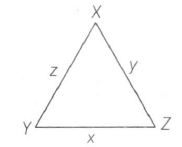Answer:
Option A,C,D
Explanation:
Given a △XYZ ,where 2x=x+y+z

and s−x4=s−y3=s−z2
∴ s−x4=s−y3=s−z2
= 3x−(x+y+z)4+3+2=s9
or s−x4=s−y3=s−z2=s9=λ(let)
⇒ s=9λ,s=4λ+x,s=3λ+y
and s=2λ+z
∴ s=9λ,x=5λ,y=6λ,z=7λ
Now, △=√s(s−x)(s−y)(s−z) [heron's formula]
=√9λ.4λ.3λ.2λ=6√6λ2 .........(i)
Also, πr2=8π3
⇒ r3=83 .......(ii)
and R=xyz4△
=(5λ)(6λ)(7λ)4.6.√6λ2=35λ4√6 .......(iii)
Now, r2=83=△2S2=216λ281λ2
⇒ 83=83λ2 [from Eq. (ii)]
⇒ λ=1
(a) △XYZ=6√6λ2=6√6
∴ Option (a) is correct.
(b) Radius of circumcircle
(R)=354√6λ=354√6
∴ Option (b) is incorrect.
(c) Since, r=4RsinX2.sinY2.sinZ2
⇒2√2√3=4.354√6sinX2sinY2sinZ2
⇒435=sinX2sinY2sinZ2
∴ Option (c) is correct.
(d) sin2(X+Y2)=cos2(Z2) . as
X+Y2=900−Z2=s(s−z)xy=9×25×6=35
∴ Option (d) is correct